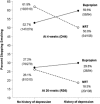Randomized trial of nicotine replacement therapy (NRT), bupropion and NRT plus bupropion for smoking cessation: effectiveness in clinical practice
- PMID: 23859696
- PMCID: PMC4282128
- DOI: 10.1111/add.12304
Randomized trial of nicotine replacement therapy (NRT), bupropion and NRT plus bupropion for smoking cessation: effectiveness in clinical practice
Abstract
Background and aims: Bupropion was introduced for smoking cessation following a pivotal trial showing that it gave improved efficacy over the nicotine patch and also suggesting combination treatment was beneficial. We tested in clinical practice for an effectiveness difference between bupropion and nicotine replacement therapy (NRT), whether the combination improves effectiveness and whether either treatment might be more beneficial for certain subgroups of smokers.
Design: Open-label randomized controlled trial with 6-month follow-up.
Setting: Four UK National Health Service (NHS) smoking cessation clinics.
Participants: Smokers (n = 1071) received seven weekly behavioural support sessions and were randomized to an NRT product of their choice (n = 418), bupropion (n = 409) or NRT plus bupropion (n = 244).
Measures: The primary outcome was self-reported cessation over 6 months, with biochemical verification at 1 and 6 months. Also measured were baseline demographics, health history, smoking characteristics and unwanted events during treatment.
Findings: Abstinence rates for bupropion (27.9%) and NRT (24.2%) were not significantly different (odds ratio = 1.21, 95% confidence interval = 0.883-1.67), and the combination rate (24.2%) was similar to that for either treatment alone. There was some evidence that the relative effectiveness of bupropion and NRT differed according to depression (χ(2) = 2.86, P = 0.091), with bupropion appearing more beneficial than NRT in those with a history of depression (29.8 versus 18.5%). Several unwanted symptoms were more common with bupropion.
Conclusion: There is no difference in smoking cessation effectiveness among bupropion, nicotine replacement therapy and their combination when used with behavioural support in clinical practice. There is some evidence that bupropion is more beneficial than nicotine replacement therapy for smokers with a history of depression.
Keywords: Bupropion; NHS; NRT; combination treatment; depression; randomized trial; smoking cessation; varenicline.
© 2013 Society for the Study of Addiction.
Figures
References
-
- Jorenby DE, Leischow SJ, Nides MA, Rennard SI, Johnston JA, Hughes AR, et al. A controlled trial of sustained-release bupropion, a nicotine patch, or both for smoking cessation. N Engl J Med. 1999;340:685–691. - PubMed
-
- Górecka D, Bednarek M, Nowiński A, Puścińska E, Goljan-Geremek A, Zieliński J. Effect of treatment for nicotine dependence in patients with COPD. Pneumonol Alergol Pol. 2003;71:411–417. - PubMed
-
- Uyar M, Filiz A, Bayram N, Elbek O, Herken H, Topcu A, et al. A randomized trial of smoking cessation. Medication versus motivation. Saudi Med J. 2007;28:922–926. - PubMed
-
- Evins AE, Cather C, Culhane MA, Birnbaum A, Horowitz J, Hsieh E, et al. A 12-week double-blind, placebo-controlled study of bupropion SR added to high-dose dual nicotine replacement therapy for smoking cessation or reduction in schizophrenia. J Clin Psychopharmacol. 2007;27:380–386. - PubMed
Publication types
MeSH terms
Substances
Associated data
Grants and funding
LinkOut - more resources
Full Text Sources
Other Literature Sources
Medical



